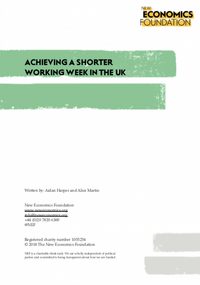Achieving a shorter working week in the UK
The case for a shorter working week
03 December 2018
Working time is once again becoming a salient political issue. The looming threat of technological unemployment, low wages, stalled UK productivity growth, an ageing society and growing care demands are all driving the debate. The New Economics Foundation has long informed the shorter working week agenda, leading research that has underpinned recent support from the Trades Union Congress and a spectrum of politicians and media outlets.
This briefing summarises the case for shortening people’s working hours without a loss in pay and puts forward an initial policy framework for getting there. It also marks the beginning of a new stream of work supporting those in trade unions, industry and government seeking to pursue this cause in the UK and across Europe.
Work can be remunerated in time, as well as money. Winning demands for shorter working hours with incomes protected offers a way of tackling both individual and societal symptoms of overwork and underpay, providing people with more time to recuperate, participate in democratic process and fulfil caring responsibilities.
Reducing the amount of time we all spend in work wields potential benefits for some of the major economic and societal challenges faced today such as an ageing population, ailing social care and pension provision. We argue that firms can benefit too through higher levels of per employee productivity and, though a reduction of working time is not a silver bullet, the potential benefits are significant.
Campaigns Shorter working week
Topics Work & pay







